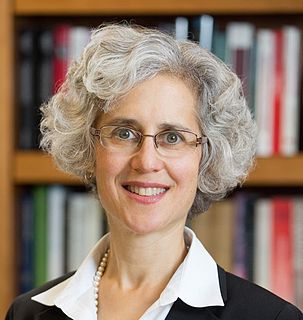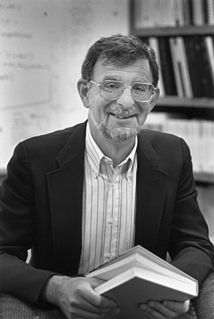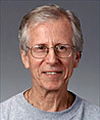Cognitive archaeology is a theoretical perspective in archaeology that focuses on the ancient mind. It is divided into two main groups: evolutionary cognitive archaeology (ECA), which seeks to understand human cognitive evolution from the material record, and ideational cognitive archaeology (ICA), which focuses on the symbolic structures discernable in or inferable from past material culture.
Dedre Dariel Gentner is an American cognitive and developmental psychologist. She is the Alice Gabriel Twight Professor of Psychology at Northwestern University. She is a leading researcher in the study of analogical reasoning.
Robert Goldstone is a Distinguished Professor of psychology and cognitive science at Indiana University in Bloomington, Indiana. His research interests include concept learning and representation, perceptual learning, collective behavior, and computational modeling of human cognition. He has developed and empirically tested neural network models that simultaneously learn new perceptual and conceptual representations, with the learned concepts both affecting and being affected by perception. He has also developed computational models of how groups of people compete for resources, cooperate to solve problems, exchange information and innovations, and form coalitions.
Leda Cosmides is an American psychologist, who, together with anthropologist husband John Tooby, helped develop the field of evolutionary psychology.

Dan Sperber is a French social and cognitive scientist and philosopher. His most influential work has been in the fields of cognitive anthropology, linguistic pragmatics, psychology of reasoning, and philosophy of the social sciences. He has developed: an approach to cultural evolution known as the epidemiology of representations or cultural attraction theory as part of a naturalistic reconceptualization of the social; relevance theory; the argumentative theory of reasoning. Sperber formerly Directeur de Recherche at the Centre National de la Recherche Scientifique is Professor in the Departments of Cognitive Science and of Philosophy at the Central European University in Budapest.

Robert Allen Bjork is Distinguished Professor of Psychology at the University of California, Los Angeles. His research focuses on human learning and memory and on the implications of the science of learning for instruction and training. He is the creator of the directed forgetting paradigm. He was elected a member of the National Academy of Sciences in 2022.
Psychological anthropology is an interdisciplinary subfield of anthropology that studies the interaction of cultural and mental processes. This subfield tends to focus on ways in which humans' development and enculturation within a particular cultural group—with its own history, language, practices, and conceptual categories—shape processes of human cognition, emotion, perception, motivation, and mental health. It also examines how the understanding of cognition, emotion, motivation, and similar psychological processes inform or constrain our models of cultural and social processes. Each school within psychological anthropology has its own approach.
Cognitive science of religion is the study of religious thought and behavior from the perspective of cognitive science, and often engages with evolutionary science, which it assumes is its foundation. Cognitive science focuses on what and how does the human mind function as well as how people think. It looks into cognitive processes such as perception, attention, memory, conceptualization, communication, reasoning, learning, decision-making, and imagination. All of this helps in aiding on dissecting religion with the use of cognitive science. The field employs methods and theories from a wide range of disciplines, including cognitive psychology, evolutionary anthropology, cognitive anthropology, artificial intelligence, developmental psychology, and archaeology. Scholars in this field seek to explain how human minds acquire, generate, and transmit religious thoughts, practices, and schemas by means of ordinary cognitive capacities.
Harvey Whitehouse is chair of social anthropology and professorial fellow of Magdalen College at the University of Oxford.

John Terrence Cacioppo was the Tiffany and Margaret Blake Distinguished Service Professor at the University of Chicago. He founded the University of Chicago Center for Cognitive and Social Neuroscience and was the director of the Arete Initiative of the Office of the Vice President for Research and National Laboratories at the University of Chicago. He co-founded the field of social neuroscience and was member of the department of psychology, department of psychiatry and behavioral neuroscience, and the college until his death in March 2018.
The International Association for the Cognitive Science of Religion (IACSR), founded in 2006, is a scholarly association dedicated to the promotion of the Cognitive Science of Religion. The IACSR is an interdisciplinary association, including scholars from a wide variety of disciplines in the human, social, natural and health sciences that are interested in the academic, scientific study of religious phenomena. The IACSR seeks to advance the naturalistic study of religion. It is strictly scientific and does not encourage or welcome those who are interested in dialogue between science and religion, attempt to find religion in science and science in religion, or attempt to validate religious or spiritual doctrines through cognitive science.
Lawrence Shapiro is a professor in the Department of Philosophy at the University of Wisconsin–Madison in the United States. His research focuses in the philosophy of psychology. He also works in both the philosophy of mind, and philosophy of biology.

Susan A. Gelman is currently Heinz Werner Distinguished University Professor of psychology and linguistics and the director of the Conceptual Development Laboratory at the University of Michigan. Gelman studies language and concept development in young children. Gelman subscribes to the domain specificity view of cognition, which asserts that the mind is composed of specialized modules supervising specific functions in the human and other animals. Her book The Essential Child is an influential work on cognitive development.
George Mandler was an Austrian-born American psychologist, who became a distinguished professor of psychology at the University of California, San Diego.

David Klahr is an American psychologist whose research ranges across the fields of cognitive development, psychology of science, and educational psychology and has been a professor at Carnegie Mellon University since 1969. He is the Walter van Dyke Bingham Professor of Cognitive Development and Education Sciences at Carnegie Mellon University and a member of the National Academy of Education, a Fellow of the American Psychological Association, a Charter Fellow of the Association for Psychological Science, on the Governing Board of the Cognitive Development Society, a member of the Society for Research in Child Development, and the Cognitive Science Society. He was an associate editor of Developmental Psychology and has served on the editorial boards of several cognitive science journals, as well as on the National Science Foundation's subcommittee on Memory and Cognitive Processes, and the National Institutes of Health's Human Development and Aging Study Section.
The LIDA cognitive architecture is an integrated artificial cognitive system that attempts to model a broad spectrum of cognition in biological systems, from low-level perception/action to high-level reasoning. Developed primarily by Stan Franklin and colleagues at the University of Memphis, the LIDA architecture is empirically grounded in cognitive science and cognitive neuroscience. In addition to providing hypotheses to guide further research, the architecture can support control structures for software agents and robots. Providing plausible explanations for many cognitive processes, the LIDA conceptual model is also intended as a tool with which to think about how minds work.

Robert S. Wyer Jr. is a visiting professor at the University of Cincinnati and Professor (Emeritus) at the University of Illinois, Urbana-Champaign. He received his doctoral degree from the University of Colorado. His research interests cut across numerous areas of social information processing, including knowledge accessibility, comprehension, memory, social inference, the impact of affect on judgment and decisions, attitude formation and change, and consumer judgment and decision-making.
This bibliography of anthropology lists some notable publications in the field of anthropology, including its various subfields. It is not comprehensive and continues to be developed. It also includes a number of works that are not by anthropologists but are relevant to the field, such as literary theory, sociology, psychology, and philosophical anthropology.

The UCL Division of Psychology and Language Sciences is a Division within the Faculty of Brain Sciences of University College London (UCL) and is located in London, United Kingdom. The Division offers teaching and training and undertakes research in psychology and communication and allied clinical and basic science. It is the largest university psychology department in England.
The theory of divergent modes of religiosity (DMR) is intended to explain how religions are created, transmitted, and changed. DMR theory was first developed by anthropologist Harvey Whitehouse following his ethnographic fieldwork in Papua New Guinea. The theory proposes that religions tend to coalesce around two divergent modes, termed imagistic and doctrinal, which are distinguished primarily by their ritual practices. The imagistic mode is characterized by infrequently performed, high arousal rituals and is associated with small scale, exclusive religious groups. In contrast the doctrinal mode is characterized by frequently performed, low arousal rituals and is associated with larger inclusive communities, as found in the major world religions.







